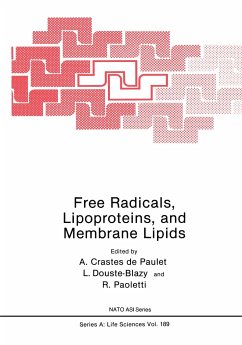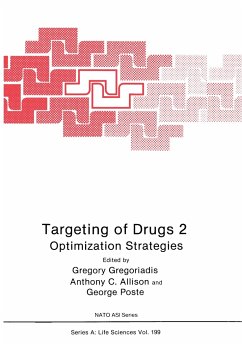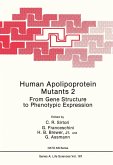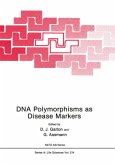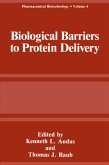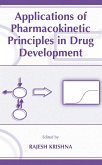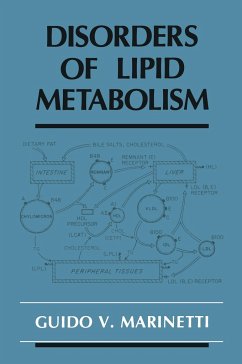Drugs Affecting Lipid Metabolism
Herausgegeben von Paoletti, Rodolfo; Kritchevsky, David; Holmes, William L.
Drugs Affecting Lipid Metabolism
Herausgegeben von Paoletti, Rodolfo; Kritchevsky, David; Holmes, William L.
- Broschiertes Buch
- Merkliste
- Auf die Merkliste
- Bewerten Bewerten
- Teilen
- Produkt teilen
- Produkterinnerung
- Produkterinnerung
The recent symposium and the appearance of this new book on Drugs Affecting Lipid Metabolism take place at a very unusual time for the development of this area. After the publication and wide acceptance of the results of the cholestyramine study by the Lipid Clinics in the USA, showing for the first time a direct association between drug induced reduction of plasma levels of total and LDL cholesterol and coronary heart disease in a high risk population, an unparalleled interest in drugs and other procedures able to control plasma cholesterol levels has been activated. Two other significant…mehr
Andere Kunden interessierten sich auch für
![Free Radicals, Lipoproteins, and Membrane Lipids Free Radicals, Lipoproteins, and Membrane Lipids]() Free Radicals, Lipoproteins, and Membrane Lipids39,99 €
Free Radicals, Lipoproteins, and Membrane Lipids39,99 €![Targeting of Drugs 2 Targeting of Drugs 2]() Targeting of Drugs 239,99 €
Targeting of Drugs 239,99 €![Human Apolipoprotein Mutants 2 Human Apolipoprotein Mutants 2]() Cesare SirtoriHuman Apolipoprotein Mutants 239,99 €
Cesare SirtoriHuman Apolipoprotein Mutants 239,99 €![DNA Polymorphisms as Disease Markers DNA Polymorphisms as Disease Markers]() DNA Polymorphisms as Disease Markers39,99 €
DNA Polymorphisms as Disease Markers39,99 €![Biological Barriers to Protein Delivery Biological Barriers to Protein Delivery]() Biological Barriers to Protein Delivery39,99 €
Biological Barriers to Protein Delivery39,99 €![Applications of Pharmacokinetic Principles in Drug Development Applications of Pharmacokinetic Principles in Drug Development]() Applications of Pharmacokinetic Principles in Drug Development76,99 €
Applications of Pharmacokinetic Principles in Drug Development76,99 €![Disorders of Lipid Metabolism Disorders of Lipid Metabolism]() G. V. MarinettiDisorders of Lipid Metabolism75,99 €
G. V. MarinettiDisorders of Lipid Metabolism75,99 €-
-
-
The recent symposium and the appearance of this new book on Drugs Affecting Lipid Metabolism take place at a very unusual time for the development of this area. After the publication and wide acceptance of the results of the cholestyramine study by the Lipid Clinics in the USA, showing for the first time a direct association between drug induced reduction of plasma levels of total and LDL cholesterol and coronary heart disease in a high risk population, an unparalleled interest in drugs and other procedures able to control plasma cholesterol levels has been activated. Two other significant events occurred during 1986 and 1987: the availability of compact instruments for the immediate determination of total cholesterol in plasma or total blood and the developments of new agents such as the inhibitors of HMG-CoA (hydroxymethyl glutaryl CoA) reductase and ACAT inhibitors, with potentially great effect on plasma lipid levels after oral administration. These new advances, together with the combined efforts of cell biologists and lipoprotein chemists, have set the pace for an exciting period of research and clinical applications of diets and drugs af fecting lipids. This volume, which includes the work of many of the leading world laboratories, represents an authoritative and up-to-date ap praisal of the status of the art and a stimulus to future research at laboratory and clinical level in an area of opportunity for clinical and preventive medicine.
Produktdetails
- Produktdetails
- Proceedings in Life Sciences
- Verlag: Springer / Springer Berlin Heidelberg / Springer, Berlin
- Artikelnr. des Verlages: 978-3-642-71704-8
- Softcover reprint of the original 1st ed. 1987
- Seitenzahl: 472
- Erscheinungstermin: 17. November 2011
- Englisch
- Abmessung: 242mm x 170mm x 26mm
- Gewicht: 801g
- ISBN-13: 9783642717048
- ISBN-10: 3642717047
- Artikelnr.: 39492552
- Herstellerkennzeichnung Die Herstellerinformationen sind derzeit nicht verfügbar.
- Proceedings in Life Sciences
- Verlag: Springer / Springer Berlin Heidelberg / Springer, Berlin
- Artikelnr. des Verlages: 978-3-642-71704-8
- Softcover reprint of the original 1st ed. 1987
- Seitenzahl: 472
- Erscheinungstermin: 17. November 2011
- Englisch
- Abmessung: 242mm x 170mm x 26mm
- Gewicht: 801g
- ISBN-13: 9783642717048
- ISBN-10: 3642717047
- Artikelnr.: 39492552
- Herstellerkennzeichnung Die Herstellerinformationen sind derzeit nicht verfügbar.
Relationship of Cholesterol to DNA Synthesis in Normal and Cancerous Cells.- Turnover of HMG-CoA Reductase is Influenced by Phosphorylation.- Regulation of ACAT.- Dietary and Pharmacological Control of Cholesterol, 7?-Hydroxylase.- Recent Advances in Metabolic Pathways of Bile Acid Synthesis.- Bile Acid Sequestrants: Do They Have a Future?.- Transport of Cholesterol and Cholesterol Esters by HDL.- Role of HDL in the Metabolism of the Plasma Lipoproteins.- The Structure of ApoB-100: Structure-Function Studies.- A Genetic Marker in the Apolipoprotein AI/CIII Gene Complex Associated with Hypercholesterolaemia.- Cellular and Molecular Biology of Apolipoproteins: Receptor-Mediated Regulation of Cholesterol Metabolism.- APOA-I and APOA-II Metabolism and Coronary Artery Disease.- Hypocholesterolemic Drugs and Lipoprotein Metabolism.- Hypotriglyceridemic Drugs and Lipoprotein Catabolism.- Lipolysis and Lipoprotein Metabolism.- Regulation of Lipoprotein Lipase Activity: Its Role in Lipid-Lowering Therapies.- Lipolysis and Antilipolytic Drugs at Different Ages.- Fatty Acid-Binding Proteins of Various Tissues.- Interaction of Lipid-Lowering Drugs with Fatty Acid-Binding Proteins.- Animal Models for Hyperlipidemia-Induced Atherosclerosis.- Animal Species as Models of Spontaneous and Induced Hyperlipidemias: A Critical Appraisal.- Rabbit Models Hypo- or Hyperresponsive to Changes in Diet.- Plasma Lipoproteins and Cholesterol Metabolism in a Strain of Hyperlipemic Rats.- Spontaneous Hypertriglyceridemia in a Non-Obese Rat Model: The IVA-SIV Rat.- Considerations for Controlled Clinical Testing of Safety and Efficacy of New Hypolipidemic Drugs.- Desirable Lipoprotein Parameters in Early Drug Trials.- Metabolic Studies with Lovastatin in Patients with Primary Hypercholesteremia.-Reduction of Plasma Lipids and Lipoproteins by Dietary Fish Oils in Patients with Hypertriglyceridemia.- Effects of Monounsaturated Fatty Acids Versus Complex Carbohydrates on Serum Lipoprotein Subfractions and Apolipoproteins in Healthy Men and Women.- Changes of Eicosanoid Formation in Relation to Dietary Lipids and in Hyperlipaemia.- Effects of Omega-3 Polyunsaturated Fatty Acids on Human Leukocyte Function and Biochemistry.- Dietary and Biochemical Studies with Textured Soy Proteins.- Detection of Reactive Free Radicals in Livers of Ethanol-Fed Rats: Potentiating Effect of High Fat Diets.- The Role of the Antioxidant Tocopherol in Lipid and Lipoprotein Metabolism.- Newer Aspects of Fats and Lipid Metabolism.- Can We Retard Atherogenesis by Modifying High-Density Lipoprotein Metabolism?.- Effects of Lipid-Lowering Drugs on High Density Lipoprotein Structure and Metabolism.- Enzyme-Inducers and High-Density Lipoproteins.- Gonadal Steroids and Hormone Antagonists.- The Effects of Adrenoceptor and Adrenergic Blocking Drugs on Plasma Lipoproteins.- The Influence of Terpenes and Analogues on Parameters of Atherosclerosis.- Initial Stages of Reverse Transport of Cholesterol.- Lipolytic Enzymes and HDL: Influence of Drugs and Hormones.- Human Apolipoprotein A-I and A-II Metabolism.- Roles of LCAT and Lipid Transfer Protein in HDL Metabolism.- The Profile of an HMG-CoA Reductase Inhibitor, CS-514(SQ 31,000).- Induction of Hepatic Low-Density Lipoprotein Receptors in Heterozygous WHHL Rabbits Treated with CS-514 Alone or CS-514 in Combination with Cholestyramine.- The Clinical Pharmacology of SQ 31,000 (CS 514) in Healthy Subjects.- Long-Term Effects of CS-514 on Serum Lipoprotein Lipid and Apolipoprotein Levels in Patients with Familial Hypercholesterolemia.- Intensive DrugTreatment for Familial Hypercholesterolemia.- Effect of CS-514 on Hypercholesterolemic Patients.- Hyperlipoproteinemia and Therapy: Results of a Multicenter Trial with Bezafibrate, a New Lipid-Lowering Drug.- Lipoprotein Changes Induced by Bezafibrate - 200 mg t.i.d. - and by Bezafibrate in a Slow-Release Preparation - 400 mg Once a Day - in Patients with Primary Hyperlipoproteinaemia.- Modifications of Apoprotein, Lipoprotein Parameters and HDL2 and HDL3 Subfractions During Treatment with Bezafibrate Retard.- Effect of Bezafibrate Retard on Plasma Lipoproteins in Hypertriglyceridemic Patients With and Without Diabetes Mellitus.- Long-Term Experience of a Single Daily Dose of Bezafibrate Retard 400 in Hyperlipoproteinaemia of Types IIa, IIb and IV.- Effects of Bezafibrate on Lipoprotein Metabolism in Cell Culture.- Efficacy and Tolerance of Fenofibrate: A Ten-Year Experience.- Mechanism of Action of Fenofibrate: New Data.- Species Differences in the Metabolic Disposition of Fenofibrate.- Pharmacokinetics of Lipanthyl in the Elderly.- Effect of Fenofibrate on Lipoprotein Particles Predictive of Coronary Atherosclerosis.- Tentative Biochemical Approach to Fenofibrate Efficacy in Tinnitus Aurium.- Clinical Effect of Lipanthyl on Tinnitus Aurium and Other Symptoms Related to Inner Ear Disorders.- Effect of Gemfibrozil Administration on Biliary Lipid Secretion: A Crossover Study with Clofibrate.- Plasma Lipids, Lipoproteins, and Apoproteins During Gemfibrozil Treatment in Primary Hyperlipidemias.- Effects of Gemfibrozil on Lipoproteins in Patients with Dyslipoproteinemia.- HDL Deficiency, Atherosclerosis, and Stimulation of HDL Synthesis: Role of Gemfibrozil.- Hemorheological Activity of Gemfibrozil in Primary Hyperlipidemias.- Evaluation of Hypolipidemic and OtherUseful Pharmacological Properties of Various Nicotinic Acid Derivatives.- Pharmacokinetics and Metabolism of 2-Tert-Butyl-4-Cyclohexyl-Phenyl Nicotinate (L-44) in Rats.- Effects of Etofibrate on Risk Factors of Atherosclerosis.- Hyperaggregability of Platelets in Patients with Hyperlipoproteinemia Type IIb Under Treatment with Etofibrate Retard and Acetylsalicylic Acid.- Effect of Etofibrate on Platelet Function in Hyperlipidemic Patients.- Importance of Phospholipids in Cholesterol-Solubilizing Capacity of High-Density Lipoproteins.- Effects of Polyunsaturated Phospholipid on Cholesterol Efflux in Vitro and in Experimental Animals and Human Subjects.- Phospholipids in Human Atherosclerosis.- Effect of Polyunsaturated Phosphatidylcholine (PPC) on Plasma Lipoproteins in Patients with Type II Hyperlipoproteinemia.- Dietary Lecithin: Metabolism, Fate, and Effects on Metabolism of Lipids and Lipoproteins.- Effects of Pantethine on Lipid Metabolism in Isolated Rat Hepatocytes.- Effects of Pantethine on Experimental Atherosclerosis in Rabbits.- Modified LDL in Humans: Effect of Pantethine.- Changes in Platelet Membrane Lipid Composition Following Pantethine Administration.- Pantethine Treatment in Type III Hyperlipoproteinemia.
Relationship of Cholesterol to DNA Synthesis in Normal and Cancerous Cells.- Turnover of HMG-CoA Reductase is Influenced by Phosphorylation.- Regulation of ACAT.- Dietary and Pharmacological Control of Cholesterol, 7?-Hydroxylase.- Recent Advances in Metabolic Pathways of Bile Acid Synthesis.- Bile Acid Sequestrants: Do They Have a Future?.- Transport of Cholesterol and Cholesterol Esters by HDL.- Role of HDL in the Metabolism of the Plasma Lipoproteins.- The Structure of ApoB-100: Structure-Function Studies.- A Genetic Marker in the Apolipoprotein AI/CIII Gene Complex Associated with Hypercholesterolaemia.- Cellular and Molecular Biology of Apolipoproteins: Receptor-Mediated Regulation of Cholesterol Metabolism.- APOA-I and APOA-II Metabolism and Coronary Artery Disease.- Hypocholesterolemic Drugs and Lipoprotein Metabolism.- Hypotriglyceridemic Drugs and Lipoprotein Catabolism.- Lipolysis and Lipoprotein Metabolism.- Regulation of Lipoprotein Lipase Activity: Its Role in Lipid-Lowering Therapies.- Lipolysis and Antilipolytic Drugs at Different Ages.- Fatty Acid-Binding Proteins of Various Tissues.- Interaction of Lipid-Lowering Drugs with Fatty Acid-Binding Proteins.- Animal Models for Hyperlipidemia-Induced Atherosclerosis.- Animal Species as Models of Spontaneous and Induced Hyperlipidemias: A Critical Appraisal.- Rabbit Models Hypo- or Hyperresponsive to Changes in Diet.- Plasma Lipoproteins and Cholesterol Metabolism in a Strain of Hyperlipemic Rats.- Spontaneous Hypertriglyceridemia in a Non-Obese Rat Model: The IVA-SIV Rat.- Considerations for Controlled Clinical Testing of Safety and Efficacy of New Hypolipidemic Drugs.- Desirable Lipoprotein Parameters in Early Drug Trials.- Metabolic Studies with Lovastatin in Patients with Primary Hypercholesteremia.-Reduction of Plasma Lipids and Lipoproteins by Dietary Fish Oils in Patients with Hypertriglyceridemia.- Effects of Monounsaturated Fatty Acids Versus Complex Carbohydrates on Serum Lipoprotein Subfractions and Apolipoproteins in Healthy Men and Women.- Changes of Eicosanoid Formation in Relation to Dietary Lipids and in Hyperlipaemia.- Effects of Omega-3 Polyunsaturated Fatty Acids on Human Leukocyte Function and Biochemistry.- Dietary and Biochemical Studies with Textured Soy Proteins.- Detection of Reactive Free Radicals in Livers of Ethanol-Fed Rats: Potentiating Effect of High Fat Diets.- The Role of the Antioxidant Tocopherol in Lipid and Lipoprotein Metabolism.- Newer Aspects of Fats and Lipid Metabolism.- Can We Retard Atherogenesis by Modifying High-Density Lipoprotein Metabolism?.- Effects of Lipid-Lowering Drugs on High Density Lipoprotein Structure and Metabolism.- Enzyme-Inducers and High-Density Lipoproteins.- Gonadal Steroids and Hormone Antagonists.- The Effects of Adrenoceptor and Adrenergic Blocking Drugs on Plasma Lipoproteins.- The Influence of Terpenes and Analogues on Parameters of Atherosclerosis.- Initial Stages of Reverse Transport of Cholesterol.- Lipolytic Enzymes and HDL: Influence of Drugs and Hormones.- Human Apolipoprotein A-I and A-II Metabolism.- Roles of LCAT and Lipid Transfer Protein in HDL Metabolism.- The Profile of an HMG-CoA Reductase Inhibitor, CS-514(SQ 31,000).- Induction of Hepatic Low-Density Lipoprotein Receptors in Heterozygous WHHL Rabbits Treated with CS-514 Alone or CS-514 in Combination with Cholestyramine.- The Clinical Pharmacology of SQ 31,000 (CS 514) in Healthy Subjects.- Long-Term Effects of CS-514 on Serum Lipoprotein Lipid and Apolipoprotein Levels in Patients with Familial Hypercholesterolemia.- Intensive DrugTreatment for Familial Hypercholesterolemia.- Effect of CS-514 on Hypercholesterolemic Patients.- Hyperlipoproteinemia and Therapy: Results of a Multicenter Trial with Bezafibrate, a New Lipid-Lowering Drug.- Lipoprotein Changes Induced by Bezafibrate - 200 mg t.i.d. - and by Bezafibrate in a Slow-Release Preparation - 400 mg Once a Day - in Patients with Primary Hyperlipoproteinaemia.- Modifications of Apoprotein, Lipoprotein Parameters and HDL2 and HDL3 Subfractions During Treatment with Bezafibrate Retard.- Effect of Bezafibrate Retard on Plasma Lipoproteins in Hypertriglyceridemic Patients With and Without Diabetes Mellitus.- Long-Term Experience of a Single Daily Dose of Bezafibrate Retard 400 in Hyperlipoproteinaemia of Types IIa, IIb and IV.- Effects of Bezafibrate on Lipoprotein Metabolism in Cell Culture.- Efficacy and Tolerance of Fenofibrate: A Ten-Year Experience.- Mechanism of Action of Fenofibrate: New Data.- Species Differences in the Metabolic Disposition of Fenofibrate.- Pharmacokinetics of Lipanthyl in the Elderly.- Effect of Fenofibrate on Lipoprotein Particles Predictive of Coronary Atherosclerosis.- Tentative Biochemical Approach to Fenofibrate Efficacy in Tinnitus Aurium.- Clinical Effect of Lipanthyl on Tinnitus Aurium and Other Symptoms Related to Inner Ear Disorders.- Effect of Gemfibrozil Administration on Biliary Lipid Secretion: A Crossover Study with Clofibrate.- Plasma Lipids, Lipoproteins, and Apoproteins During Gemfibrozil Treatment in Primary Hyperlipidemias.- Effects of Gemfibrozil on Lipoproteins in Patients with Dyslipoproteinemia.- HDL Deficiency, Atherosclerosis, and Stimulation of HDL Synthesis: Role of Gemfibrozil.- Hemorheological Activity of Gemfibrozil in Primary Hyperlipidemias.- Evaluation of Hypolipidemic and OtherUseful Pharmacological Properties of Various Nicotinic Acid Derivatives.- Pharmacokinetics and Metabolism of 2-Tert-Butyl-4-Cyclohexyl-Phenyl Nicotinate (L-44) in Rats.- Effects of Etofibrate on Risk Factors of Atherosclerosis.- Hyperaggregability of Platelets in Patients with Hyperlipoproteinemia Type IIb Under Treatment with Etofibrate Retard and Acetylsalicylic Acid.- Effect of Etofibrate on Platelet Function in Hyperlipidemic Patients.- Importance of Phospholipids in Cholesterol-Solubilizing Capacity of High-Density Lipoproteins.- Effects of Polyunsaturated Phospholipid on Cholesterol Efflux in Vitro and in Experimental Animals and Human Subjects.- Phospholipids in Human Atherosclerosis.- Effect of Polyunsaturated Phosphatidylcholine (PPC) on Plasma Lipoproteins in Patients with Type II Hyperlipoproteinemia.- Dietary Lecithin: Metabolism, Fate, and Effects on Metabolism of Lipids and Lipoproteins.- Effects of Pantethine on Lipid Metabolism in Isolated Rat Hepatocytes.- Effects of Pantethine on Experimental Atherosclerosis in Rabbits.- Modified LDL in Humans: Effect of Pantethine.- Changes in Platelet Membrane Lipid Composition Following Pantethine Administration.- Pantethine Treatment in Type III Hyperlipoproteinemia.



